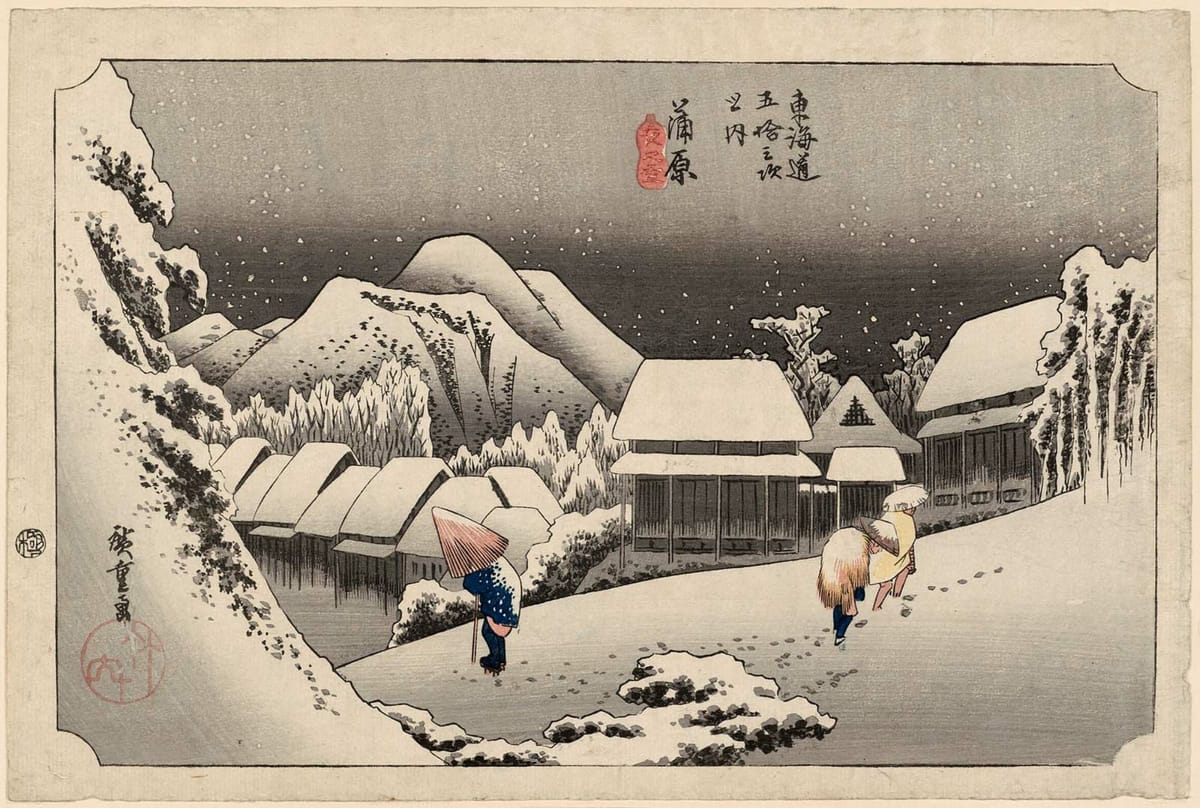A Murder Survivor & 53 Stations of the T?kaid?
Survival and defiance in the face of violence, and how an amateur artist established a major genre

Featured Articles
The Bullet in My Mother’s Head
In this deeply personal, haunting, yet beautiful article, Ryan Nourai shares his journey to understand the violence of his mother's abduction and shooting. He uncovers not just the violence she endured but the strength that defined her. Join him as he explores survival, defiance, trauma, and how it can traverse generations.
I turned to Don and told him I had got what I’d come for. What that was, I wasn’t sure. At times, I thought it was my mother’s strength I was looking for. In other moments, it was to imagine myself facing what she experienced, wondering whether if I didn’t come to this place, I would be a son lacking devotion.
Fabricating Dreams. On Ando Tokutaro -aka Utagawa Hiroshige
I’m grateful to the excellent The Browser newsletter for surfacing this one. We have three Hiroshige reproductions from Adachi adorning our walls, and learning more about them and their period has been a treat. I hope this also serves as an introduction to the world of ukiyo-e for you.
Legend goes that Hiroshige made the journey along the route in 1832 with a convoy of horses sent by the shōgun to the emperor. Most likely he never did, at least not until the series became a resounding success. Several of his landscape scenes are in fact drawn from illustrations. . .
Published in The Montréal Review
Other Recommended Reading
‘We pledged not to eat each other’: the family that was shipwrecked for 38 days
In this tale of survival, Douglas Robertson recounts the 38 days his family spent adrift at sea after their boat was attacked by whales. From drinking turtle blood to the struggle for food, these memories reveal the resilience we can show in the face of adversity, highlighting their unique bond and determination to survive against all odds.
They soon realised how hopeless the situation was. They were hundreds of miles from land with a raft and a flooded dinghy. “We had 10 days’ supply of tinned water and 10 days’ food if we didn’t eat much. It was stowed alongside a manual about how to survive on the raft. On the last page it said: ‘Good luck!’” The trouble was, they weren’t within 10 days of land.
There Will Be Blood
In this interview with the ecologist Hugh Warwick, we explore the complex and sometimes troubling world of conservation efforts that involve culling invasive species. Suppose you've ever wondered where to draw the line between protecting native species and the moral implications of our choices. In that case, this piece offers interesting perspectives and acknowledges the moral weight of those decisions.
There is an argument for letting nature take its course. Other species will come along and fill the vacant niches. But that’s a little bit like being at the Louvre and seeing art on fire and going, “Yeah, but we’ll get more art. That’s fine.” And I think there is something to be said for protecting what you’ve got, especially when the reason the fire has started is because we lit it.
Adventures Close to Home
Phil Christman explores our complex relationship with travel (maybe his relationship is a little more complex than ours) and questions its benefits. The article is a mix of personal anecdotes and thoughtful musings, and it is entertaining as it invites us to rethink what it means to journey, both physically and mentally.
In disconnecting us from the ongoing and sometimes nightmarish dailiness of our lives, travel allows us to “do nothing and be nobody.” For Callard, this makes it a preview of death, the nothingness that will put an end to our quotidian boredom forever.
Fear as a Game
What is it about fear that draws us in? This article explores the complex relationship we have with fear, from thrilling amusement park rides to the safe scares of horror movies. With how we engage with fear as a game, maybe we take on unnecessary obstacles and fears for the pleasure of overcoming them.
In disconnecting us from the ongoing and sometimes nightmarish dailiness of our lives, travel allows us to “do nothing and be nobody.” For Callard, this makes it a preview of death, the nothingness that will put an end to our quotidian boredom forever.




